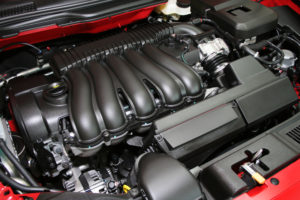There’s no way around it, occasional engine repairs come with owning a car. While engine maintenance services like tune-ups and oil changes will help prevent more severe repairs, it’s still likely you’ll run into engine trouble at some point. When this happens, it helps to know what signs to look out for if it’s time to have a mechanic inspect your car’s engine, whether it’s a change in performance or a dashboard warning light. The sooner you’re able to schedule an engine repair, the better off both you and your car will be.

1. Poor Acceleration or Loss of Power
Imagine cruising down the road when suddenly your car doesn’t respond the way it should when you press the gas pedal – or maybe you start to notice your car jerking or stuttering while driving. Both poor acceleration and engine misfires are a sign it’s time to have your engine inspected and repaired.
Spark Plugs, Sensors, or Engine Oil May Need to Be Replaced
If you’re dealing with poor acceleration, a loss of power, or engine misfires, you’re most likely dealing with worn spark plugs or sensors. It’s also possible your engine oil is too dirty, old, or low. Any of these engine problems should be a simple fix for your mechanic when caught early.
2. Knocking or Other Strange Sounds While Driving
A healthy engine makes a gentle hum or rev – if you notice new sounds coming from under the hood, it could be time for an engine repair. In particular, a knocking sound is a good indication there’s engine damage that will only get worse to more you continue to drive.
Carbon Deposit Buildup Leads to Engine Knocking
Typically, engine knocking happens as a result of improper fuel combustion, which leads to a buildup of carbon deposits in the combustion chambers. When fuel isn’t fully burned or there’s secondary combustion, it causes damage and leaves deposits on the pistons, cylinder heads, and other important parts of the engine.
3. Excess Exhaust Fumes
Unless it’s cold outside, you probably don’t notice visible exhaust fumes coming from your car – and that’s normal. However, if you start noticing smoke from your car’s tailpipe, it may be time to bring your car to a mechanic for an engine checkup. It’s likely there’s a problem with the air-fuel ratio in the engine or improper combustion.
Black, White, or Blue-Grey Exhaust Smoke Points to a Fuel Problem
The good news is white steam from your exhaust is normal and simply due to condensation in the tailpipe – most commonly in the winter. However, if you notice black, white, grey, or blue smoke, it’s not normal. Black smoke indicates a too-rich air-fuel ratio, which will also impact your fuel economy.
Bluish smoke, which can look grey, points to the engine burning too much fuel. White or grey smoke indicates a coolant leak into the cylinders, which may mean essential parts in your engine are cracked or the head gasket is blown.
4. Oil Drips Under Your Vehicle
When you pull out of or into a parking spot, have you ever noticed spots underneath your car? If you notice spots from drips that seem to come from the front end of your car, it could mean an engine oil leak. In particular, pay attention to the smell and color of the fluid – engine oil will look brown-to-black in color.
Leaking Engine Oil Can Quickly Lead to Bigger Problems
Any fluid leak from your car is a sign it’s time to visit your mechanic. If your engine oil is leaking, it can easily lead to an overheating engine, poor performance, or other serious problems. The longer the leak is left undiagnosed, the lower your engine oil level becomes, increasing the risk of serious engine repairs.
5. The Check Engine Light Comes On
Car owners hear a lot about the Check Engine Light – so much so that you may be tempted to just ignore it when it comes on. While some problems indicated by the Check Engine Light may be minor, any engine problems will only continue to grow with time, so it’s best to have your mechanic inspect your vehicle as soon as possible. Plus, this dashboard warning light can also indicate you’re already dealing with a serious engine repair.
Trouble Codes Will Point Your Mechanic in the Right Direction
![]()
Your mechanic will likely start by checking your car’s trouble codes. These show what has triggered the warning light so your mechanic knows where to look for diagnostics. The Check Engine Light can indicate a problem with the fuel delivery system, engine, or emissions, so it’s important to have any repairs handled right away.
Trust AAMCO Louisville’s Mechanics with Your Car’s Engine Repair
Whether you’re worried about an engine repair or just need a regular maintenance service, you can trust your local AAMCO Louisville auto shop with your car’s care. Call us today with questions or easily schedule your appointment online.
